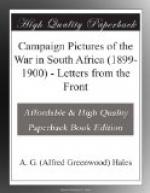From the little farmhouse hospital I was sent on in an ambulance train to the hospital at Springfontein, where all the nurses and medical staff are foreigners, all of them trained and skilful. Even the nurses had a soldierly air about them. Here everything was as clean as human industry could make it, and the hospital was worked like a piece of military mechanism. I only had a day or two here, and then I was sent by train in an ambulance carriage to the capital of the Orange Free State, and here I am in Bloemfontein Hospital. There are a lot of our wounded here, both officers and men, some of whom have been here for months.
I have made it my business to get about amongst the private soldiers, to question them concerning the treatment they have received since the moment the Mauser rifles tumbled them over, and I say emphatically that in every solitary instance, without one single exception, our countrymen declare that they have been grandly treated. Not by the hospital nurses only, not by the officials alone, but by the very men whom they were fighting. Our “Tommies” are not the men to waste praise on any men unless it is well deserved, but this is just about how “Tommy” sums up the situation:
“The Boer is a rough-looking beggar in the field, ’e don’t wear no uniform, ’nd ‘e don’t know enough about soldiers’ drill to keep himself warm, but ’e can fight in ‘is own bloomin’ style, which ain’t our style. If ’e’d come out on the veldt, ’nd fight us our way, we’d lick ’im every time, but when it comes to fightin’ in the kopjes, why, the Boer is a dandy, ’nd if the rest of Europe don’t think so, only let ’em have a try at ’im ’nd see. But when ’e has shot you he acts like a blessed Christian, ’nd bears no malice. ‘E’s like a bloomin’ South Sea cocoanut, not much to look at outside, but white ’nd sweet inside when yer know ’im, ’nd it’s when you’re wounded ’nd a prisoner that you get a chance to know ’im, see.” And “Tommy” is about correct in his judgment.




